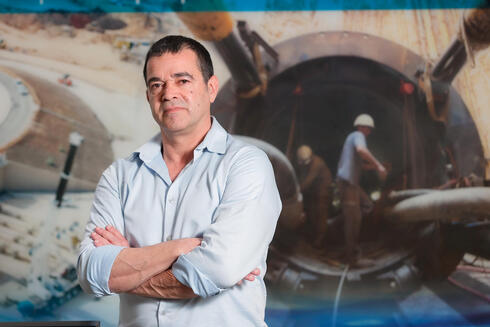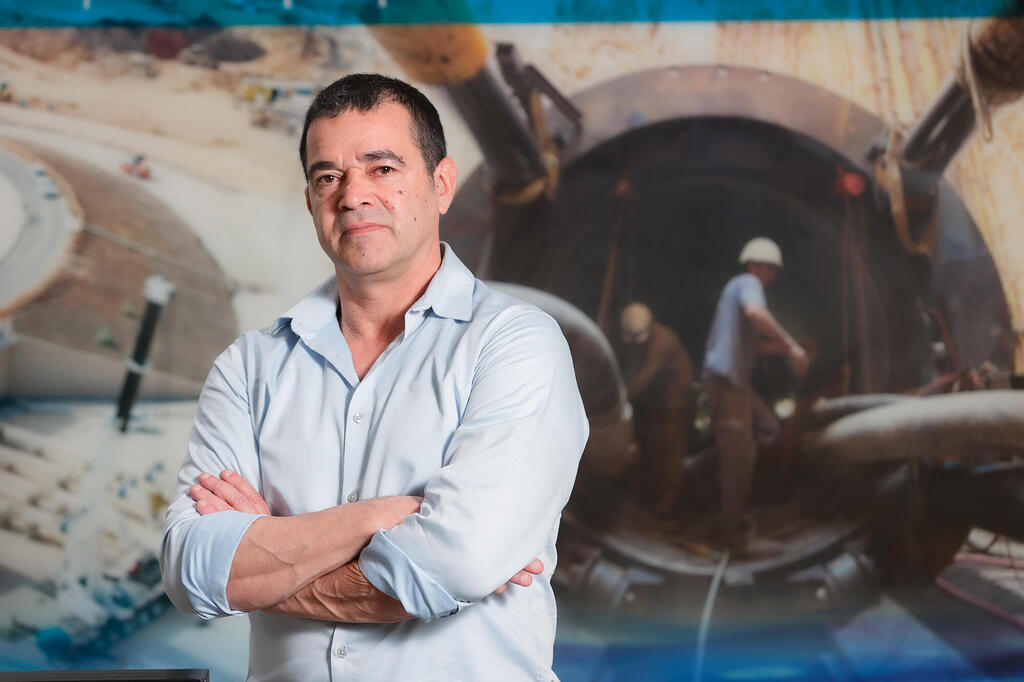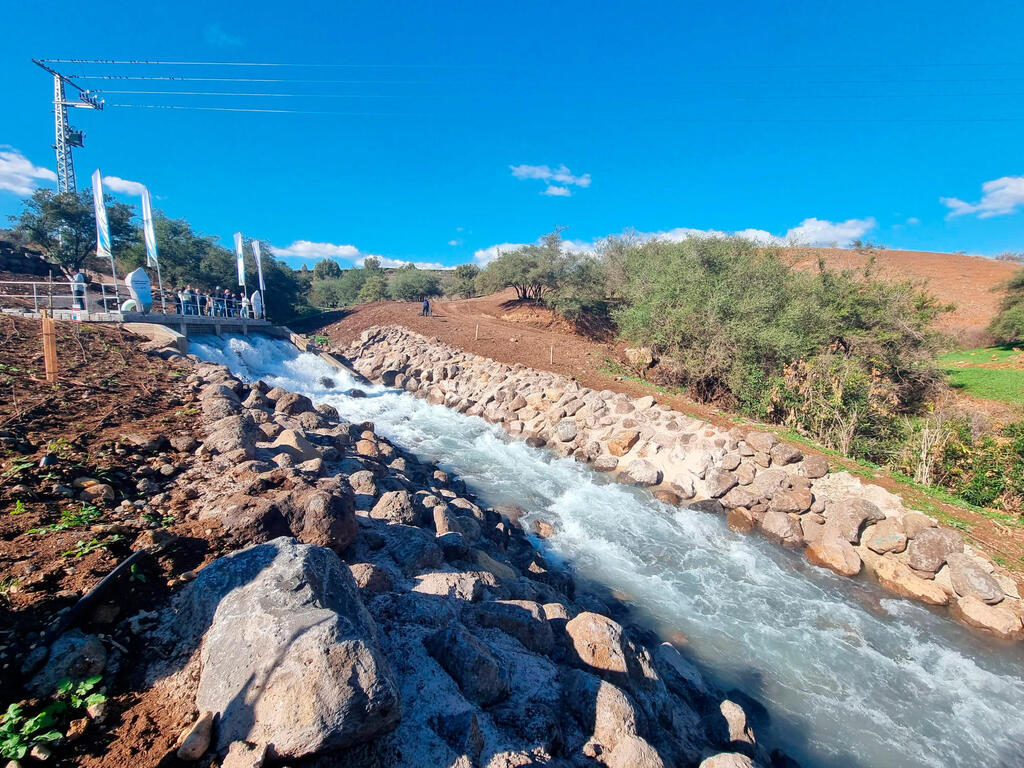
Interview
Making waves: For Mekorot CEO, current situation doesn’t hold water
Mekorot CEO Amit Lang shares how he is requesting an increase in the annual development budget of NIS 400 million to enable an optimal response in extreme scenarios. He’s also critical of the Water Authority, which for years has been delaying the connection of the Golan Heights, the Finger of the Galilee and the Jordan Valley to the national water carrier
Is Israel's water system prepared for extreme scenarios such as prolonged droughts or a strong earthquake like the one that struck Turkey a few weeks ago? Amit Lang, the CEO of Mekorot, is convinced that the company under his management has high performance capabilities in routine and emergency situations, but he is full of criticism of the regulator responsible for it, the Water Authority. He says the authority delays the connection of the Jordan Valley, the Finger of the Galilee and the Golan Heights to the national water carrier, which exposes them to real harm in the event of an environmental disaster.
In an interview with Calcalist, Lang expresses these concerns, as well as the concern over the state's refusal to increase Mekorot's annual development budget, and expresses his dissatisfaction with the regulators interference in the scope of services that Mekorot can sell abroad.
A few weeks ago there was a big earthquake in Turkey that was also felt in Israel. According to the State Comptroller, the water sector in Israel is not prepared for earthquakes.
"The comptroller's report does not comment on Mekorot at all. The only reference to the company is in the establishment of a national control center, which Mekorot is setting up in any case for its current work. Mekorot is very well prepared, and we have proven it more than once. We also make sure that the facilities are earthquake-resistant to the strictest standards and take care of their backup."
So can we be calm? In case of an earthquake will we have water?
"Mekorot is just one link in the water supply chain. In an emergency there are other links, which do not depend on us, and the state comptroller commented that they are not prepared. We are asked to bring water to the points to which we are committed. In most scenarios, and most likely, Mekorot will be very resilient and prepared.
"However, one cannot expect that after a significant earthquake there will be water within an hour, because it is possible that the systems will be destroyed, but we are prepared to provide alternative solutions in the immediate and short term, and repair what is needed. For example, in an earthquake the first thing that goes down is electricity, and it is impossible to supply water without electricity (Mekorot is the largest consumer of civilian electricity in Israel). That's why we have generators that are supposed to come into operation in case of an emergency and are scattered at the critical points throughout the country that will allow the water system to continue operating."
The earthquake in Turkey did affect the quality of the water, and residents were asked to boil the water before use.
"The earthquake did not damage the water supply, it caused water turbidity in some areas of the country that are disconnected from the national water system. The reason is simple - the areas that are disconnected from the national water system are based on deep water drilling. When the drilling shakes, the sides begin to crumble and sand and dirt enter the water.
"If the areas were connected to the national water infrastructure, there would be a backup for the water wells. It would be possible to disconnect the wells, clean them and in the meantime flow water from the national system. This is exactly the reason why we think we must connect the disconnected areas in Israel, which are more prone to earthquakes - the Jordan Valley and the Syrian-African rift. In the end, you want water quality so that you don't have to ask yourself if you need to boil it or not, and you blindly trust that all the tests have been done."
What prevents you from connecting the disconnected areas?
"The Water Authority Council needs to decide to do this. As part of our development plan, there are also several alternatives for connecting the regions, and we presented the Water Authority with the advantages and disadvantages of each alternative, whether it is for the Golan Heights or for the eastern valleys. But they are the ones who determine the policy and should decide how. Years have passed and there has been no decision on the issue."
What is the reason for the delay in the decision?
"Within the Water Authority there are internal debates. To some extent, they will tell you that the connection of the disconnected areas is also related to the effect on the rate. In my eyes, this is an evasive argument because Mekorot is only 20% of the rate. Therefore, when it is taken to this place, I am a little indignant.
"If you ask them, some of them will tell you that they prefer that the local authorities make these connections because most of the water there goes to agriculture. In my eyes, this is an irrelevant argument, and I have no problem saying it in the most unequivocal way that only Mekorot should connect the disconnected regions to the national system and not any other entity. Mekorot's performance quality is known all over the world, for reliability in supply and emergency preparedness. I don't think there is another entity in the water sector that knows how to operate according to Mekorot's standards."
What does Mekorot's development budget look like?
"The water sector, at least as far as Mekorot is concerned, is not a matter of budget. It is a matter of rate. Mekorot's development budget is based on the water rate. Mekorot, with all its size and influence, is only 20% of the water rate. The water corporations are 45%, Desalination plants 16% and possibly even more in the future.
"We spend NIS 1.6 billion a year on development. We think it is possible to take that to NIS 2 billion a year, and give much more response to extreme scenarios that are not just an earthquake. An extreme scenario can also be a sequence of five years of drought. Now we have excellent solutions to the drought. I must say a good word about the Israeli government, which has been able to develop the economy and desalination facilities so that even in years of drought there will be no shortage of water in Israel - but our job is to bring water everywhere. I've been asking to increase our development budget to 2- NIS 1.8 billion so that within three to four years we will be in a different place in terms of the water sector."
And you don't know how to do it with the money you have?
"First of all, what is the money I have? I am currently developing according to approvals from the Water Authority. I don't do what I want. The authority limits me to a billion and a half shekels. I showed that I know how to do even more. I know what to do, I have the ability to execute and to recruit. I recruit while maintaining the financial goals and maintaining financial strength, and I can develop even with NIS 2 billion."
Isn't it expensive to increase the development budget now at a time when interest rates are soaring?
"Mekorot in recent years has raised at a very low interest rate, and Mekorot's rating is excellent and will remain so as long as I am here. We will continue to raise at the lowest possible financing costs. On the other hand, it is impossible to stop the development of the water sector. Not in the midst of a climate crisis. At the very least, we will use the one and a half billion that they allow us. I will still claim that there is room to develop more. I also do not think that the interest rate will remain at this level for a long time."
To what extent does the interest rate increase affect the continuation of development?
"I believe that there are business cycles here. I believe that we may see more interest rate increases in the near future, given the external effects of what is happening, but I am absolutely sure that in the end this is a stable economy and it will return to some kind of equilibrium, so I estimate that within a year - a year and a half, we will see interest rates returning to another equilibrium.
“I don't know if we will return to a zero interest rate, it also depends on the world. At the moment, the Bank of Israel's main goal is to fight inflation, so I say that if there is a year or two that financing costs will be higher because of that, then that is the price. There is nothing to do now. This is true for everyone, not just me. Anyone who develops infrastructure here and uses external financing will pay more. In the long run I don't think it will stay there. I may be wrong. The future cannot be predicted. There are two types of economists, those who do not know how to forecast and those who do not know that they do not know how to forecast.
"In addition, I am a government company. A private company will make its considerations according to the needs of its shareholders. I am not a private company. I serve the citizens of the State of Israel, and as long as the Water Authority allows me to continue raise money because it sees before its eyes the need for development, then I will continue to raise money."
Another project that requires financing is the export of water to Jordan in exchange for electricity. Where does it stand today?
"That’s a question you need to ask The Ministry of Energy and the Water Authority. We have submitted more than one alternative for a wider connection for the benefit of water transport, and we are not the ones who are supposed to establish the water source. The Israeli government should decide whether to establish a dedicated desalination facility or use the existing facilities as the water source. We know how to bring the water to Jordan in the required quantity and of the required quality."
How long will it take you to extend the connection?
"We proposed several alternatives. One of them could be ready in another year and a half and is based on an existing budget that we have, on a line that bypasses Afula. There are other alternatives that will take more time."
Part of your profitability comes from planning operations abroad and investments in startups. Doesn't that distract you from the main thing?
"On the contrary, these are the things that keep us up-to-date and in the center of action, and we are very proud of these processes. Mekorot builds development plans and provides services in several countries in the world, including Argentina and Italy. Unfortunately, we are still limited in the scope of the services we can sell abroad, and no one can give me a good answer why. I think today there is an understanding in the Companies Authority and the Water Authority that the dam can be opened. They also see all the inquiries we receive and that the planning actions do not harm our activity, on the contrary - they give additional training and experience to the engineers - with challenges that do not exist in Israel. I think that they will increase our quota significantly and that it is possible to reach NIS 100 million in revenue in the coming years, the demand is huge.
"We make investments in startups in accordance with the mandate given to us by the government. We check whether the company has a product or service that can be integrated into our activity, and if we see potential for improvement in our activity with the development of the company. If so - we check whether to invest in the company or just purchase the the products. As of today, we are invested in eight companies.
"There are quite a few companies that we buy services from or let them experiment with the product with us. If the feasibility test passes successfully, we will move forward and there are already successful pilots working in our systems today."
There is an expectation that in the end the national water company will be managed with some kind of conservatism.
"Absolutely. That's why I don't want to and don't ask the regulator to allow me to enter into crazy projects, such as building systems. I stay in my lane and say listen, I know how to provide planning and support services, and even integrate software from the startups that we invest in. We don't need to take unnecessary risks."
The Companies Authority demands that you distribute a dividend of NIS 50 million to the state. In the meantime, the Minister of Finance canceled the decision to lower the water rate, and it still caused quite a stir.
"There are differences in approach between two regulators to which we are subject - the Water Authority and the Companies Authority. The Companies Authority operates according to the approach that as a profitable government company we have to pay a dividend to the state. The Water Authority says that the water sector should remain closed despite the profits, which should be invested back into the water sector. The Minister of the Treasury has announced that he wants to designate it back to the water sector.
"I do say that the government should decide on the issue so that we do not return to this ritual every year. It makes no difference to me whether the money goes back to the water sector or to the government, in any case it is not distributed to me, so it does not affect my motivation in any way. A policy needs to be established."
Should the state even profit from water supply?
"There is a glaring inconsistency here. Here too, the Water Authority claims that the distribution of a dividend can affect the water tariff and that the water system should remain closed. I claim no, but Mekorot is in any case only 20% of the tariff. 45% of it goes to the water corporations and they can distribute a dividend to the municipalities. We need to decide whether the water sector is closed or not. At the moment, the central part of this sector does pay a dividend, and the less central part does not. Someone needs to take this as a defining event and make a policy decision based on it."















